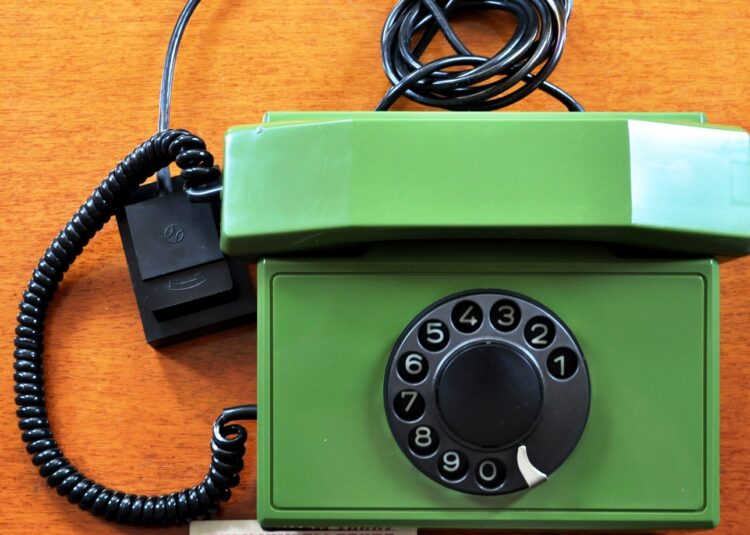
No doubt we are currently living in an age of purely technological advancements. Everyday innovations are definitely making everyone’s lives better, especially in the area of telecommunications. Even though the first discovery of landline telephones has been one of the most memorable of all times, right now the use of this telephony system is becoming a little obsolete.
For years, not only businesses but almost every household had a landline phone service that allowed them to communicate national and internationally. However, nowadays most people prefer to use wireless devices like smartphones and tablets, so the real question is: are landline telephones dying?
Before taking a look at some of the pros and cons of landline telephony, let’s first define what it is.

Landline Phone Service
Unlike a mobile phone that uses wireless transmission, a landline telephone is a device that turns audio data into signals through a copper wire or a fiber optic cable. There are few different categories of landline phones, including Plain Old Telephone Service (POTS) or more commonly referred to as Public Switched Telephone Network (PSTN), and Primary Rate Interface (PRI) which is a hybrid that allows landline telephones to carry voice data.
The term landline has been used to differentiate fixed-line home telephones from mobile ones since it is a form of communication connected to a specific phone line and most likely to be permanently hooked to a power source.
Traditional landline telephones have been around for more than a century and there was a time when they were one of the primary needs in nearly every home. For this reason, it is quite shocking to know that phone technologies of today are giving people more choices than ever, making them cut the cord on their fixed home phone services and switch to more flexible telephony options.

Pros of Landlines
- EASY TO USE – many people find a little complex to use smartphones and are not quite familiar with their features. They don’t need to deal with screen locks or touch screen features when dialing up numbers to make calls.
- STRONG CONNECTION – because most wiring is underground, landline phones tend to work efficiently with very little issues of signal. Plus, technological advances have improved home telephone hardware into being wireless, which provides more mobility around the house instead of being attached to a specific place.
- EXCELLENT VOICE QUALITY – making calls from mobile phones tends to be problematic since they rely on good signal and the voice quality is most likely to be compromised by it. Some houses are built with metal and concrete walls, which can help block telephone signals and generate poor sound quality. Landline phones not only provide clear voice quality but also different extensions around the house that allow people to move around wherever they want.
- EASY TO REACH EMERGENCY SERVICES – during an emergency, a strong signal is required in order to make 911 calls for help, which is why it is better to use a landline phone instead of moving around the place to catch signal. Plus, since landline telephone numbers are registered under a specific location, it is so much easier to trace an address and send help.

Cons of Landlines
- WIRE MAINTENANCE – the set of wires of landline telephones is either underground or hanging on poles, which is why they are vulnerable to floods, storms or even vandalism. Even though landlines count with strong connection, once something like this occurs, your home could end up uncommunicated. To fix this, almost all wires must be repaired (or replaced) and it can take a lot of time and money.
- POOR RECEPTION – having a landline telephone in wooded areas or even outside the city could affect the effectiveness of a call. People who live in a home with very poor cell service can purchase boosters from different telephone carriers, but this task can be incredibly expensive.
- NO EXTRA FEATURES – landline phones are simple devices and do not count with many features smartphones do. Most of them don’t even allow you to save contact numbers, just make and receive calls. Plus, they have limited availability in the sense that you can only use them inside the house, instead of taking them anywhere with you like a mobile phone. This lack of portability can moderately be reduced when using phone extensions, but this only causes more hardware expenses.
- SPAM CALLS – we all know how annoying spam calls are, which is why we tend to ignore some phone calls once we assume it comes from a salesperson, customer service representative or even a robocall. Most telemarketers take advantage of landlines to promote their products in a more irritating way.
- HIGH COSTS – while mobile networks offer great deals, landline phones rarely do, which makes them costly and often unaffordable. Basic landline services cost from 15$ to 30$, and most of the time just count with few important features like caller ID, call waiting and voicemail, which is why phone bills increase considerably, especially when making long-distance and international calls.
- SERVICE IMMOBILITY – landline telephonies have their phone numbers assigned to a unique phone line, which is why they demand their users to provide a physical address in order to set up the service. For this reason, consumers spend quite some time contacting the phone company to have the telephone service transferred to a new location.

As always, before making a decision it is important to take under consideration all pros and cons, especially when it comes to phone service. Nowadays, people look for the best at an affordable price, which is why you cantry Non-VoIP phone service.
It is a brand-new flexible technology used as a home phone line or with the smartphone’s internet connection to make voice and video calls hosted in the cloud. The greatest characteristic of this broadband telephony is that it does not depend on a specific location, which means that a user from the UK can acquire a virtual telephone number from the US – there are no geographic limitations whatsoever.
Non VoIP services widely vary between providers since this technology is based on strong telecommunications software. Some virtual telephonies of this kind provide numbers that allow users to make and receive audio/video calls while others, just instant messaging – this is the case of VerifyWithSMS.
Without a doubt, this service is simple, fast and reliable. Experts estimate landlines to be obsolete by 2025, don’t waste more time and make a change. Sign up today for real US based phones!











